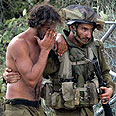
A just war
Second Lebanon War is in fact a war for the peace of the Galilee
I remember well the time when I first learned of the plans to embark on the first Lebanon War. It was a late afternoon on June 6th, 1982. A group of some 50 people were seated together at the IDF chief education officer's lecturers department. We had been recruited for some reason or other on the first day of the war, as though we were supposed to activate some secret and vital weapon instead of using our verbal powers.
And then in shock I heard the officer, who had just come out of the "bunker," openly deliver the message of war, which at the time was named Operation Peace for Galilee.
A few weeks and months later, then Prime Minister Menachem Begin would contend that he knew nothing of the plan, and even opposition leader at the time Shimon Peres, who voted in favor of the war with his faction, maintained that he did not know that this was the original plan.
However, we, among many others, knew very well from the outset what the ambitious plan that was executed and failed was all about: To destroy the small Fatahland in the south of Lebanon; to reach Beirut and take it over; to join up with the Christians and Druze and to establish a new government that would make peace with Israel.
At the time, there was no mention of a 40-kilometer exit strategy, but rather, the takeover of Beirut; the occupation of an Arab capital -something Israel did not dare do until then.
A week later, I was sent home with a few other colleagues, including my friend Professor Avi Ravitzki. The chief education officer realized that a soldier could be sent to fight in a war that he doesn't believe in, but that there is no way to force someone to justify the war in front of soldiers, when he himself sees it as a foolish, vile and unnecessary act from day one.
And indeed, the years that have elapsed since then proved right those who from the outset doubted the necessity and effectiveness of this war of choice: The thousand of soldiers who were killed and injured, the vast resources that went into the war, the Sabra and Shatila affair, the undermined peace atmosphere vis-a-vis Egypt, the rise of the Shiites in the south and the formation of Hizbullah, and particularly – that same PLO that was ousted from Lebanon only to return via Tunisia to the West Bank and the Gaza Strip.
Will Galilee ever have peace?
Much blood was shed for naught, the chaos in Lebanon increased, and the diplomatic atmosphere in the region deteriorated even further. Hence, during the difficult years that followed the original name of the war faded, and Peace of Galilee simply turned into the Lebanon War.
A year ago, on July 12th, Hizbullah - the Lebanese military organization that advocates Israel's destruction – launched an attack on Israel from the international border. It killed eight soldiers and captured two and began barraging the northern part of Israel with Katyusha rocket fire. I shall not repeat what happened last year, as it is well known.
Israel's forceful response to the attack was morally just, and this is also how it is perceived by most of the world, including parts of the Arab world. It is true that despite its justification, it lasted longer than it should have and revealed a host of weaknesses both in the army and in the fortification of the home front.
However, weaknesses and failures are not necessarily moral defects, just as victories and achievements are not proof of a moral advantage.
In stark contrast to its elder bloody sister, this war, which is still being called the Second Lebanon War, is actually Operation Peace for Galilee. It is taking back the original name of the first Lebanon War, which was desecrated with blood and destruction by the Begin government.
Will the Galilee ever have peace? I don't know. If this war, whose first anniversary we're marking, turns not only into a punching bag but also into a long list of urgent acts that need to be addressed, including rectifying military shortcomings, fortifying northern communities, formulating a Security Council agreement on the international border, and particularly bold moves to reach a peace agreement with Syria – there is, after all, a real chance for future peace in the north.
After all, the north is much broader than we think – it extends from Metula and Nahariya to the outskirts of Tel Aviv.










